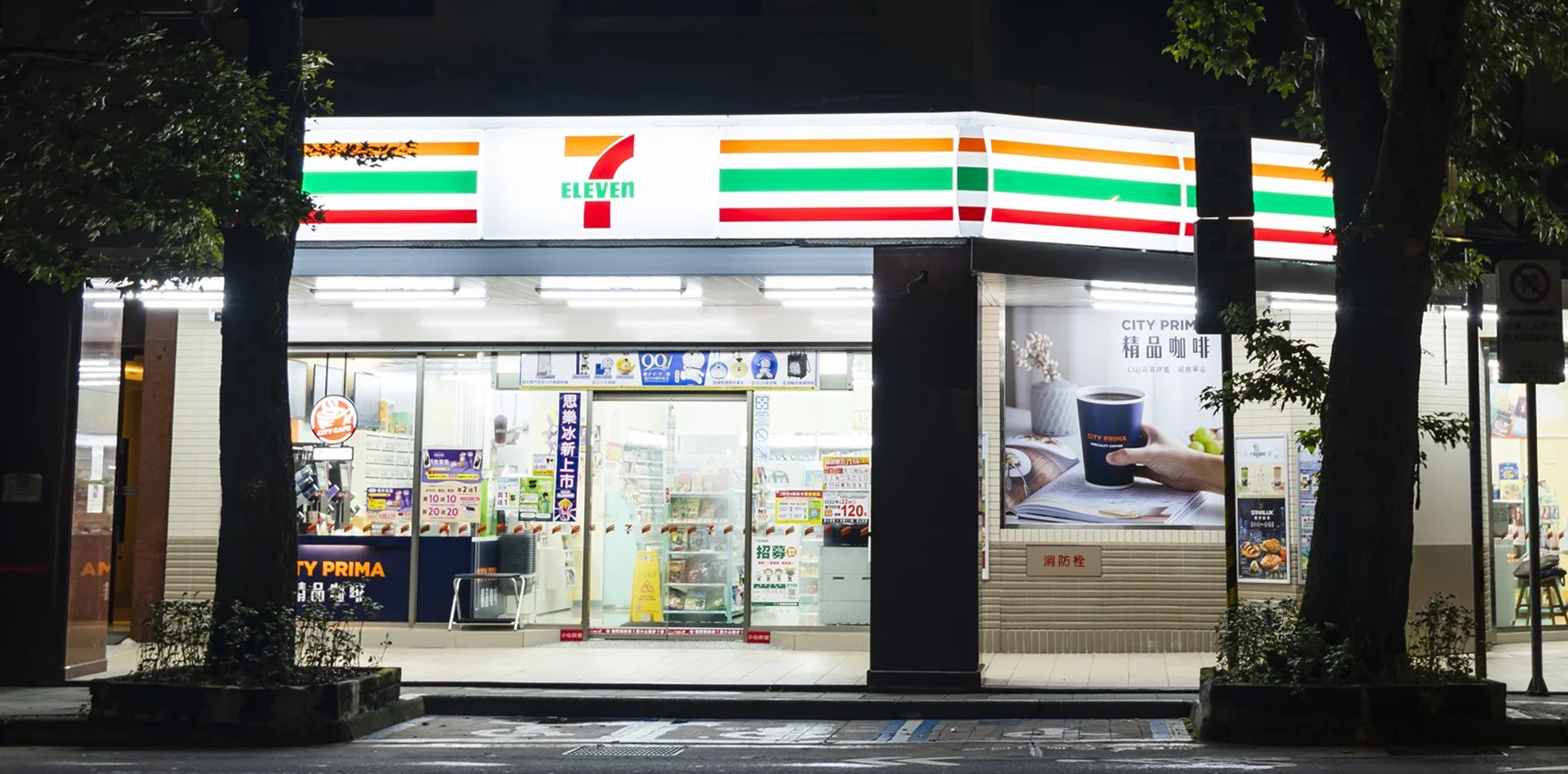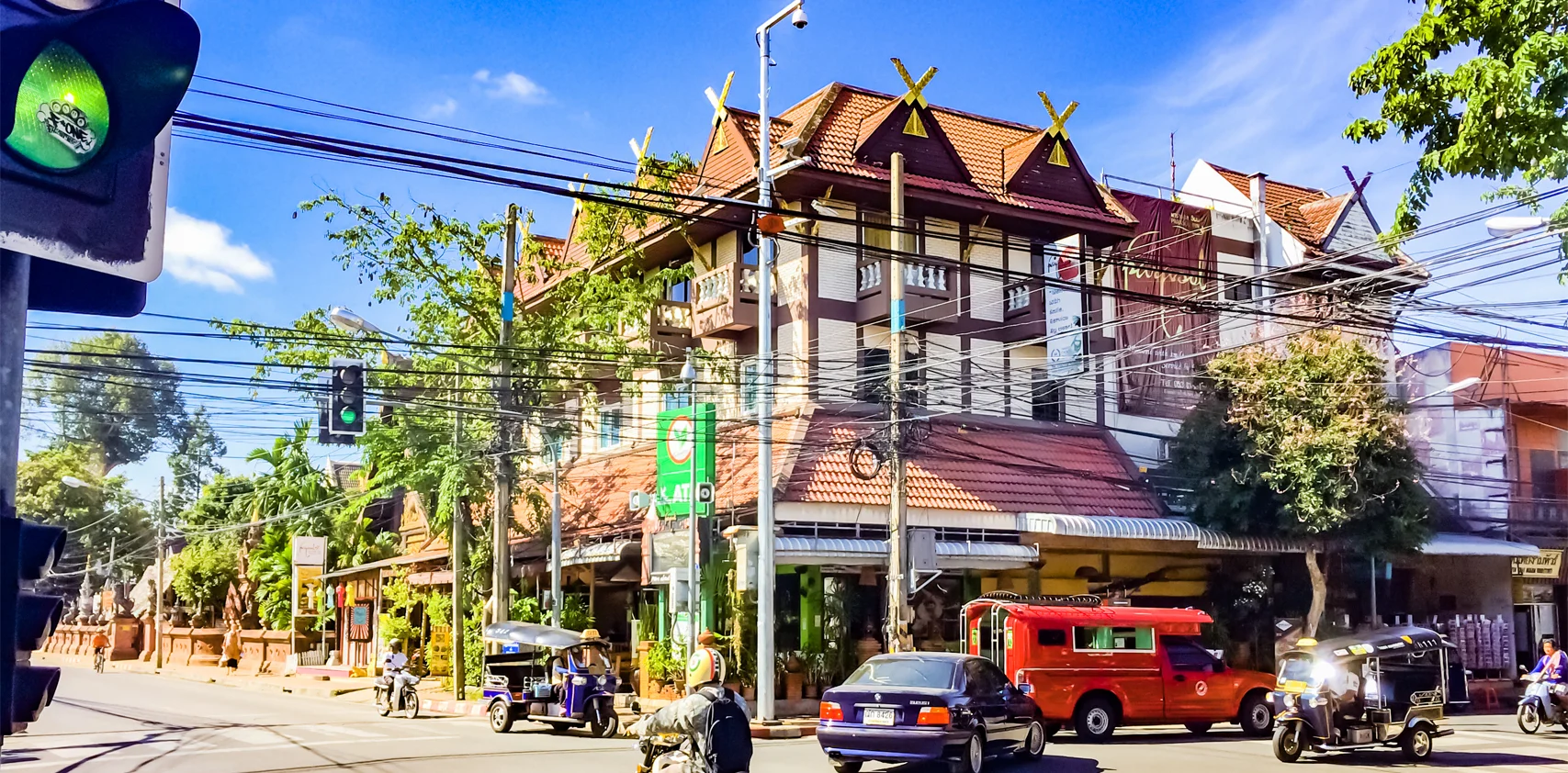Lifestyle
14 posts
Sort by Latest

Why Taiwan’s 7-Eleven Is the Nomad’s Best Friend?
When you think of a convenience store, you probably imagine a place where you grab a bottle of water, maybe a bag of chips, and rush out in under two minutes. But in Taiwan, the experience is completely different. As a digital nomad living here, I can say this with full confidence: 7-Eleven is more than a convenience store—it’s a life hub. Whether you're working remotely, navigating local bureaucracy, or just trying to survive your first typhoon season, 7-Eleven becomes your reliable, all-purpose sidekick. Here’s why every nomad in Taiwan should get to know their neighborhood 7-Eleven (and maybe even become emotionally attached to it). 🧑💻 1. Your Backup Coworking Space Sometimes the coworking space is full, or your Airbnb Wi-Fi goes out right before a Zoom call. No problem—just walk into a nearby 7-Eleven. Many stores have indoor seating, power outlets, and reliable air conditioning. Some even offer free Wi-Fi (especially in urban areas). It's not unusual to see students, freelancers, and office workers typing away in the corner, iced latte in hand. And that latte? Made fresh by a machine that delivers surprisingly decent espresso. Add an egg salad sandwich and you're ready for a productive morning. 🍱 2. Meals, Snacks & Midnight Survival Kits Need a quick lunch between calls? 7-Eleven has you covered with hot bentos (lunchboxes), rice balls, dumplings, pasta, and even vegan options. The food is affordable, filling, and rotates seasonally—yes, there’s a pumpkin-flavored croquette in fall and sweet potato desserts in winter. Late-night hunger pangs? No problem. Most stores are open 24/7, and yes, the staff will microwave your meal, give you utensils, and smile while doing it. 🖨️ 3. Print, Scan, Fax—All Without a Printer One of the biggest struggles for nomads is accessing printing and scanning services. In Taiwan, just walk to 7-Eleven and use the ibon machine. You can: Print documents from your USB or cloud Scan and email files Make photocopies or fax something if needed Even print passport photos or buy resume templates! The interface is available in English, and the process is fast and shockingly cheap. 📦 4. Your Personal Mailroom Online shopping is huge in Taiwan, and 7-Eleven plays a central role in the logistics system. You can: Pick up packages from Shopee, PChome, or other platforms Send local or international parcels Even rent lockers in some branches to receive deliveries while you're out exploring Taroko Gorge No apartment mailbox? No problem. 💡 5. A Swiss Army Knife of Life Services This is where 7-Eleven goes full superpower mode: Pay your rent, electric bill, or even traffic fines Recharge your SIM card, MRT card, or game credits Book train tickets, concerts, or theme parks Use the ATM to withdraw money (many support international cards) Buy tickets for exhibitions, shows, or even a spa reservation All of this is done at the kiosk or counter, often with staff willing to help if you get confused (they’re used to expats and tourists!). 💬 6. The Cultural Warmth You Didn’t Expect Beyond the services, 7-Eleven is a microcosm of Taiwanese hospitality. Store clerks greet you with a “歡迎光臨” (huān yíng guāng lín — welcome) every time. Some will remember your face or your coffee order. You might find yourself chatting with a fellow nomad while waiting for the microwave to finish. It’s the place you go when everything else is closed, when you're slightly lost, or when you just need a quiet corner to collect yourself. It becomes part of your daily rhythm. 🧳 Conclusion: A True Friend on the Road For digital nomads in Taiwan, 7-Eleven isn’t just a convenience—it’s a daily lifeline. It meets practical needs, yes, but also offers a subtle form of companionship in a foreign land. It's your office, your kitchen, your mailbox, your translator, and your guide—all wrapped in one neon-lit, air-conditioned corner of comfort. So next time you're in Taiwan, don't just pass by a 7-Eleven. Step inside, grab a hot latte, and get stuff done. You’ll walk out wondering how you ever lived without it. -- Follow the Digital Nomad Facebook fan page and stay updated with more recent articles on Instagram (@digital.nomad.press)!
June 10, 2025

Digital Nomad Pre-Departure Checklist: The Simple Packing Guide
1. Packing Principles : Nomadic Life ≠ Backpacking Trip A digital nomad’s luggage must support both work and daily life. So before packing, remember these three key principles: Lightweight but not careless: You’re not on vacation—you’ll be working remotely for an extended period. Multi-functionality is key: Every item you bring should ideally serve two or more purposes. Backup and flexibility: In case of internet outages, locked cards, or lost items—you need a Plan B. 2. Digital Nomad Gear Checklist (Global Essentials) 1. Remote Work Kit 2. Minimalist Living Kit 3. Safety & Emergency Kit 4. Optional but Helpful Add-ons 3. Commonly Overlooked Essentials These items may seem minor, but many digital nomads regret not bringing them once they’re on the road: Power strip (with USB ports): Many places only offer one outlet—use a strip to charge laptop, phone, and earbuds all at once. Earplugs and sleep mask: In hostels, airplanes, or noisy neighborhoods, good sleep is gold. Backups of passport and key documents: Scan and upload to Google Drive; print a set and hide it deep in your bag. Multiple credit/debit cards: If one gets locked, you’ll have a backup. Understand how insurance claims work: Don’t just buy insurance—know what documents are required and prepare templates in advance. Prescription meds or personal health items: Your go-to brands or specific ingredients might not be available abroad. Feel free to share with us—what are your must-have essentials for digital nomad life? -- Follow the Digital Nomad Facebook fan page and stay updated with more recent articles on Instagram (@digital.nomad.press)!
April 16, 2025

The Guide to Digital Nomad Life in Taiwan|Top 4 Cities Compared! Transportation, Cost of Living, English Friendliness & More
Digital Nomad Life in Taiwan|City Breakdown Taipei As Taiwan’s capital, Taipei is the economic, cultural, and tech hub of the country. It's highly international, making it one of the most English-friendly cities in Taiwan. If it’s your first time here and you enjoy vibrant, fast-paced city life, Taipei should be your go-to. Taipei boasts the island’s most comprehensive MRT and bus system, covering 21 districts in both Taipei and New Taipei City. Whether you’re heading to busy areas like Ximending, Dihua Street, Tamsui Pier, or enjoying snacks at Raohe or Ningxia Night Markets, public transport will get you there easily. The city never sleeps—nightlife in Xinyi or the East District, 24/7 convenience stores, and endless food options make Taipei incredibly convenient. Transportation: ★★★★★ (Best MRT and bus system in Taiwan) Cost of Living: ★☆☆☆☆ (Higher accommodation and food costs) English Friendliness: ★★★★☆ (Tourist areas and younger people are communicative) Taipei – Chiang Kai-shek Memorial Hall(Photo from iStock.) Taichung Often considered Taiwan’s most livable city, Taichung offers a lower cost of living and pleasant weather. Centrally located, it’s also a great base for traveling north or south. While the MRT is smaller compared to Taipei, Taichung’s bus system is well-organized, making it suitable for both short visits and long-term stays. For the best experience, consider living in West District or Nantun District, which have good amenities, cafes, and coworking spaces. Explore places like Rainbow Village, Audit Village, Calligraphy Greenway, or Fengjia Night Market. For nightlife, Taichung has unique bars and scenic rooftop restaurants worth checking out. Transportation: ★★★☆☆ (Limited MRT, mostly buses and scooters) Cost of Living: ★★★☆☆ (Mid-to-low range) English Friendliness: ★★★☆☆ (Basic communication possible) Taichung – Audit Village(Photo from iStock.) Tainan Known as Taiwan’s ancient capital, Tainan is full of historical sites, traditional architecture, and rich cultural heritage. It also offers warm weather, a slower pace of life, and affordable living, making it an ideal spot for cultural immersion. Although Tainan lacks an MRT system, downtown buses are frequent and hotspots are relatively close together. For trips outside the city center, renting a car or using taxis is recommended. Stay in West Central or Anping District, where you can walk or bus to temples, museums, markets, and seaside spots. Don’t miss the Confucius Temple, Tainan Art Museum, Guohua Street, Flower Night Market, Chihkan Tower, or Yuguang Island for a balance of work and leisure. Transportation: ★★☆☆☆ (Mainly buses and walking, no MRT) Cost of Living: ★★★★☆ (Low living expenses) English Friendliness: ★★☆☆☆ (Basic communication possible) Tainan – Confucius Temple(Photo from iStock.) Hualien & Taitung Taiwan’s east coast is known for its breathtaking natural landscapes and laid-back lifestyle. However, transportation is limited, so renting a car or taking taxis is advised. Living here allows you to enjoy high quality of life at a lower cost. Must-see spots include Sanxiantai, Mr. Brown Avenue, and Zhiben Hot Springs in Taitung, or Taroko Gorge, Qingshui Cliffs, and Qixingtan Beach in Hualien—ideal for nature lovers. In Dulan, Taitung, you’ll find a growing international community of surfers, artists, and expats attracted by the slow life and vibrant Amis Indigenous culture. If you're looking to escape the city and embrace a more free-spirited lifestyle, Taiwan’s east coast offers boundless inspiration. Transportation: ★☆☆☆☆ (Mainly railways, limited buses; car rental recommended) Cost of Living: ★★★★★ (Relatively low) English Friendliness: ★★☆☆☆ (Basic communication possible) Hualien – Yuli Red Bridge(Photo from iStock.) Taitung – Sanxiantai Cross-Sea Footbridge(Photo from iStock.) Further Reading: Taiwan Digital Nomad Guide | Visa, Currency Exchange, Weather, Internet All in One View -- Authors/Irene Lin、 Digital Nomad Editor Group Follow the Digital Nomad Facebook fan page and stay updated with more recent articles on Instagram (@digital.nomad.press)!
April 9, 2025

Remote Work in Taiwan for Over 90 Days? You Must Pay Income Tax !A Guide to Taiwan’s Income Tax Rules for Foreigners
Many foreigners are considering coming to Taiwan for digital nomadism. This year, the Taiwanese government has also opened applications for a digital nomad visa, attracting even more interest. One of their key concerns is: Do I need to pay income tax in Taiwan? If so, how is it calculated? This article will clarify Taiwan’s income tax rules for digital nomads, helping them understand their tax obligations and avoid unnecessary tax risks due to unfamiliarity with local regulations. Do You Need to Pay Income Tax? It Depends on Your Stay Duration and Tax Status Taiwan’s tax residency status primarily depends on the number of days a foreigner stays in Taiwan. There are three main categories: 1. Stay Less Than 90 Days (Exempt from Tax Unless Earning Taiwan-Sourced Income) If a foreigner stays in Taiwan for less than 90 days within a calendar year, they generally do not need to pay income tax unless their income is sourced from Taiwan. Taiwan-Sourced Income: If the foreigner provides services to a Taiwan-based company, is employed by a Taiwan company, or earns income directly linked to Taiwan, they are subject to tax. Typically, the Taiwan-based company will withhold the tax at the source, or the individual may need to file before leaving Taiwan. Non-Taiwan-Sourced Income: If a digital nomad’s income comes from an overseas employer or clients (e.g., freelancing or receiving salaries from an overseas company) and has no Taiwan-sourced income, they usually do not need to file income tax in Taiwan. 2. Stay Between 90 and 183 Days (Taxable Income Required to Be Declared) If a foreigner stays in Taiwan for more than 90 days but less than 183 days, their tax obligations change: Income from Taiwan Companies: The Taiwan-based company typically withholds tax at the applicable rate, or the individual may need to file a tax return before leaving Taiwan. Income from Foreign Employers: If a foreigner provides services to overseas clients while in Taiwan, they may need to proactively declare and pay tax before leaving. With Taiwan’s digital nomad visa, foreigners can stay for a maximum of six months. If they stay in Taiwan over 183 days using another visa or method, a different tax calculation applies. 3. Stay 183 Days or More (Taxable Under Taiwan’s Progressive Tax Rate System) If a foreigner stays in Taiwan for 183 days or more, they are considered a tax resident and must declare global income to the Taiwanese government. Their income is subject to progressive tax rates (5% to 40%) as follows: Income tax filing must be done between May 1 and May 31 of the following year for the previous year’s income. However, if a foreigner leaves Taiwan mid-year, they must file their income tax return at least 10 days before departure. Foreign nationals can file their income tax with the local National Taxation Bureau or relevant offices in each region. For detailed tax information, please contact the National Taxation Bureau or visit their official website. References: Taiwan Income Tax Act Ministry of Finance Tax Portal – Foreign Taxpayer Services R.O.C. Source Income and Scope of Exemptions Further Reading : Taiwan Digital Nomad Visa is Here! Application Requirements and Required Documents All in One View! -- Follow the Digital Nomad Facebook fan page and stay updated with more recent articles on Instagram (@digital.nomad.press)!
March 14, 2025

Taiwan Digital Nomad Guide | Visa, Currency Exchange, Weather, Internet All in One View
Located in East Asia, Taiwan has long been a popular destination for digital nomads. With its affordable cost of living, safe society, stable internet, affordable healthcare resources, and a welcoming attitude toward diverse cultures, Taiwan is highly favored by digital nomads. The Economist recently published the “The Global Liveability Index 2024”, where three Taiwanese cities—Taipei (ranked 66th), Kaohsiung (72nd), and Taichung (74th)—made it to the top tier of global cities. Taiwan also ranks among the top digital nomad destinations worldwide. If you're planning to become a digital nomad in Taiwan, this "Taiwan Digital Nomad Guide Series" will provide all the essential information you need. In this edition, we cover: Taiwan Nomad | Visa Details Taiwan Nomad | Travel Seasons Taiwan Nomad | Internet Recommendations Taiwan Nomad | Currency Exchange Methods Taiwan Nomad | Living Costs Taiwan Nomad | Emergency Situations Taiwan Nomad | Visa Details Foreign nationals coming to Taiwan typically enter using a visa-free entry or a tourist visa, allowing a maximum stay of 90 days. Taiwan now also offers a Digital Nomad Visa, which permits a stay of up to six months. For eligibility requirements and application procedures for Taiwan's Digital Nomad Visa, please refer to: Taiwan Digital Nomad Visa is Here! Application Requirements and Required Documents All in One View! Additionally, eligible individuals can apply for a "Taiwan Employment Gold Card", allowing a stay in Taiwan for one to three years. Here are the details: The Taiwan Employment Gold Card is a 4-in-1 card, that includes a resident visa, work permit, Alien Resident Certificate (ARC), and re-entry permit Holders can freely search for, take up, and change jobs within the validity period. Applicants must have a monthly salary of at least TWD 160,000 (from either domestic or foreign employers). High-skilled professionals in 11 fields, including Science & Technology, Economy, Education, Culture & Arts, Sport, Finance, Law, Architecture, National Defense, Digital, and Special cases recognized by the National Development Council, are eligible to apply. Photo from Taiwan Employment Gold Card Office Extended Reading: Taiwan "Employment Gold Card" for Digital Nomads:Steps on How to Apply for It Taiwan Nomad | Travel Seasons Taiwan experiences mild seasonal temperature changes, but the characteristics of each region are different. Be sure to check the weather before your trip. Spring (March - May): Warm and comfortable, with temperatures between 15°C and 25°C. Rainy season starts in May (May - June), bringing more rainfall. Summer (June - September): Hot and humid, with temperatures often exceeding 30°C, especially in July and August. Afternoon thunderstorms are common, and this is also typhoon season. Autumn (October - November): Cool and dry, with temperatures between 20°C and 28°C. This is the most pleasant season in Taiwan, ideal for outdoor activities and travel. Winter (December - February): Average temperatures between 16°C and 20°C, with larger temperature differences between day and night. Northern Taiwan is colder and more humid, with temperatures dropping to around 10°C during cold fronts. Northern Taiwan (Taipei, New Taipei, Keelung): Humid winters with frequent drizzle, hot summers with frequent afternoon thunderstorms. Central Taiwan (Taichung, Miaoli, Changhua): Relatively stable climate, dry year-round with moderate temperatures. Southern Taiwan (Kaohsiung, Tainan, Pingtung): Hot climate, with sunshine and little rainfall most of the year, also in Winter, the temperature in winter is about 19°C to 20°C. Eastern Taiwan (Hualien, Taitung): Humid and hot, with abundant sunshine throughout the year. However, the region is frequently affected by typhoons in summer. Taiwan Nomad | Internet Recommendations As a digital nomad in Taiwan, you can choose from three short-term internet solutions: buying a SIM card, using eSIM, or renting a Wi-Fi router. Here are the details: Buying a SIM Card Taiwan’s main telecom providers include Chunghwa Telecom, Taiwan Mobile, and FarEasTone, each offering prepaid Taiwan SIM cards for tourists (Tourist Taiwan SIM) and general prepaid SIM cards (Prepaid SIM). These are available at Taoyuan International Airport, Songshan Airport, train stations, telecom company stores, and convenience stores. It’s recommended to pre-order through the telecom provider’s website or travel platforms like KKday and Klook, and pick it up at one of the mentioned locations. Tourist Taiwan SIM: Available in 3-day, 5-day, 7-day, 10-day, 15-day, and 30-day plans. Insert the SIM card and start using it immediately, but it cannot be topped up with other plans and will expire automatically after the selected period. Prepaid SIM: Buy a general SIM card and top it up with plans based on your needs, such as daily, hourly, or data-limited plans. How to choose between the three telecom providers? Chunghwa Telecom: Best for outdoor activities in mountainous or island areas / faster and more stable internet. FarEasTone & Taiwan Mobile: Suitable for use in cities / lower prices and more discounts. Using eSIM eSIM is a virtual SIM card. If your phone supports eSIM, you can purchase a plan from a telecom provider and set it up directly on your phone, eliminating the hassle of switching physical SIM cards and the risk of losing them. Renting a Wi-Fi Router You can pre-order a Wi-Fi router from rental platforms like Rent WiFi in Taiwan, KKday, or Klook, and choose home delivery or pick up and return the goods at the airport or store. The advantage is that multiple devices can connect at once, and rental periods are very flexible. Taiwan Nomad | Currency Exchange Methods Photo by johan10 from iStock. Exchange money at the counter Taiwan’s major banks include Bank of Taiwan, Mega Bank, Cathay United Bank, E.SUN Bank, CTBC Bank, First Bank, SinoPac Bank, Hua Nan Bank, Taipei Fubon Bank, and Taishin Bank. You can visit any of these banks to exchange currency in person. Bank of Taiwan and Mega Bank also have service counters and ATMs at international airports. Here’s the detailed information: Taipei Songshan Airport Bank of Taiwan Arrival Hall: 06:00 - 22:30 Departure Hall: 06:00 - 07:30 Mega Bank Arrival Hall: 08:00 - 22:30 Departure Hall: 06:00 - 07:30 Taoyuan International Airport Bank of Taiwan / Mega Bank Service hours: 05:30 - 22:30, but each counter has different hours. It’s recommended to check online before your visit. Additionally, three locations offer 24-hour foreign exchange counters: Terminal 1 Arrival Hall, 1st floor, restricted area Terminal 1 Arrival Hall Terminal 2 Arrival Hall, 1st floor, restricted area Taichung Airport Bank of Taiwan Departure Hall: 06:00 - 23:00 Arrival Baggage Claim Area: 09:00 - 17:00 (adjusted based on arrival flight schedules) Kaohsiung Airport Bank of Taiwan 3rd Floor, Departure Hall: 05:30 - 16:30 1st Floor, Arrival Hall: 09:00 - 24:00 Mega Bank 3rd Floor, Departure Hall: 05:30 - 17:00 1st Floor, Arrival Hall: 09:00 - 21:00 Online Currency Exchange You can handle currency exchange in advance using the online exchange system or mobile banking apps from various banks, and pick up the cash in person at the designated bank. It is recommended to pre-arrange online exchange and select a bank based on the airport you’ll be arriving at to save time and hassle. However, only a few airport banks provide 24-hour services, and most banks outside the airport are open from 09:00 to 15:00. If you need to exchange currency during off-hours, foreign currency ATMs are also an option. Foreign Currency ATMs There are two types of foreign currency ATMs. The first type allows you to withdraw US dollars, Japanese yen, or Chinese yuan using any bank card (some ATMs from Bank of Taiwan and E.SUN Bank also offer Euros and Hong Kong dollars). The second type of machine, a foreign currency cash ATM, allows users to scan their passport or entry permit to instantly withdraw cash in US dollars, Japanese yen, or Chinese yuan. These ATMs are available 24/7 and can be found in airports, banks, major train stations, high-speed rail stations, tourist attractions, large hotels, shopping malls, or specific convenience stores. It’s best to check the locations and the available currencies beforehand. Extended Reading: What’s the most cost-effective way to exchange currency? Check out exchange methods, fee collection, and tips for saving money on domestic and international exchanges at once! Taiwan Nomad | Living Costs Many people wonder: Is the cost of living high for digital nomads in Taiwan? According to Numbeo, the monthly living cost for a single person (excluding rent) is around TWD 24,000 in Taiwan, TWD 38,000 in the U.S., and TWD 29,000 in Japan. However, actual expenses vary depending on the region. For example, the average monthly expense per person in Taipei last year was nearly TWD 34,000. In New Taipei City, Taichung, and Kaohsiung, it was around TWD 26,000. In Tainan, it was TWD 23,000, and in Hualien and Taitung in eastern Taiwan, it was TWD 21,000. If you want to experience the vibrant city life in the north but are worried about higher living costs, you can choose to live in more affordable areas such as New Taipei City and commute using convenient public transportation. Alternatively, Taichung is also a great option with excellent living conditions and moderate expenses. If you place more emphasis on enjoying a slower-paced lifestyle, the southern and eastern regions may be more suitable for you! Lover's Bridge in Tamsui District, New Taipei City(Photo by nevereverro from iStock.) Blue Highway Night View in Dadu District, Taichung City(Photo by bernie_photo from iStock.) Liyu Lake in Hualien County(Photo by GoranQ from iStock.) Taiwan Nomad | Emergency Situations Although Taiwan is generally safe with excellent law and order, there are still some emergency situations to be aware of: Health and Medical Emergencies Taiwan has many clinics and hospitals, and when you’re feeling unwell or injured, you can search for the nearest clinic or hospital. Foreign nationals with an Employment Gold Card can benefit from Taiwan’s National Health Insurance (NHI), while those with a general visa will need to pay for medical expenses themselves. The registration fee typically ranges from TWD 500 to TWD 1,500. In case of an emergency, you can call 119 for an ambulance. Emergency room fees are higher than regular consultation fees. Legal Disputes (e.g. theft, traffic accidents) Taiwan's emergency police number is 110. If you encounter lost property, traffic accidents, or any legal issues, be sure to call the police for assistance immediately! Earthquakes Taiwan is located on a seismic belt and experiences frequent minor earthquakes. It’s possible to encounter one or two major earthquakes (above magnitude 6.0) each year, especially in the east (Taitung, Hualien) and northeast (Yilan). Although Taiwan has excellent earthquake-resistant infrastructure, it’s important to stay alert and know how to protect yourself during an earthquake. Indoors: When an earthquake occurs, take cover under a sturdy table or in a corner, protecting your head with your hands. Avoid standing near windows to prevent injury from shattered glass. If you're in a tall building, do not use the elevator; remain in place until the shaking stops before evacuating. Outdoors: Quickly move away from buildings, utility poles, and billboards that could fall. Move to an open area. If driving during an earthquake, slow down and pull over. Stay in the car and wait for the earthquake to end. Listen to Government Announcements: After an earthquake, stay updated with announcements from the Central Weather Bureau or local government. You can track earthquake alerts, magnitude, and epicenter information through the Central Weather Bureau’s website, which will also provide warnings about aftershocks. Typhoons Taiwan is prone to typhoons from June to October, which can bring strong winds, heavy rain, flooding, and landslides. It’s essential to prepare ahead of time and stay alert during typhoon season. Before the Typhoon: Monitor forecasts from the Central Weather Bureau and prepare emergency supplies like enough food, water, lighting, batteries, fully charged power banks, medications, and cash. Check that doors and windows are secure, store potted plants indoors, and ensure drainage systems are clear. Avoid parking vehicles in low-lying areas. During the Typhoon: Stay inside a safe building and ensure windows and doors are tightly closed. Move valuable items to higher floors to prevent damage from flooding. Stay updated with the latest information from the government and weather bureau. In case of a power outage, use a mobile phone or flashlight instead of candles to avoid fire hazards. Avoid unnecessary travel, but if you must go out, check the road conditions in advance. -- Written and edited by / Irene Lin Follow the Digital Nomad Facebook fan page and stay updated with more recent articles on Instagram (@digital.nomad.press)!
November 5, 2024

"Digital Nomad" Reader Submissions|Themes and Methods for Submission Revealed at Once
Are you on the digital nomad journey? Are you trying freelancing, remote work, or entrepreneurship? We sincerely invite you to share your experiences and stories to everyone! I. Submission Themes Feel free to share under themes such as digital nomadism, remote work, freelancing, entrepreneurship, personal branding, media management, overseas work, etc.: 1. Your Work Experience and Skills E.g., freelancing techniques, personal branding strategies, overseas job hunting experiences, etc. 2. Introducing Various Digital Tools Beneficial for Work and Life E.g., effective digital tools for managing remote teams. 3. Methods for Improving Work Efficiency and Time Management E.g., overcoming procrastination, enhancing efficiency in online meetings, etc. 4. Essential Knowledge on Work Visas, Payments, Cross-Border Financial Flow, Contract Signing, etc. 5. Sharing Experiences of Living in Different Places and Local Customs E.g., sharing information about local prices, culture, safety, etc. For more themes and content, please refer to the articles on the Digital Nomad official website. II. Submission Format Please send your submissions to digitalnomad@ftpm.com.tw, with the email subject titled "Digital Nomad Reader Submission: Please Fill in Article Title," and provide "Self-Introduction" and "Submission Article." 1. Self-Introduction To help us understand you better, please provide a self-introduction of about 150 words. 2. Submission Article Word Count: 1000 words. Language: Chinese or English are both acceptable. Submission File: Please provide a Google.doc cloud link with editing permissions enabled. Image Format: If you wish to provide images, please attach them to the email in .jpg format, along with captions and image sources. If there are copyright concerns regarding the images you provide, we will not use them. Contact Information: You can include your blog or social media links at the end of the article. We will create hyperlinks so that readers can get to know you better through these links. Reader submissions are unpaid, and the Digital Nomad editorial team reserves the right to decide whether to publish them. Titles may be adjusted, and content may be edited, with your consent, before publication. Due to the high volume of submissions, we will reply to your email within two weeks. Digital Nomad hopes to be a platform for digital nomads to exchange ideas. Your articles will be featured in Digital Nomad, and we will also promote them through Facebook and Instagram to help you gain visibility and explore more collaboration opportunities. The Digital Nomad team also hopes to use this opportunity to collaborate more deeply with outstanding creators in various aspects. Welcome to submit and share your journey on the digital nomad path. We look forward to the opportunity to exchange and learn together.
April 12, 2024

Digital Nomad in Chiang Mai! 8 Recommended Shared Spaces
Many novice digital nomads choose Chiang Mai as their first destination for remote work. Not only is the cost of living low and the city safe, but it also offers abundant leisure and entertainment options, making it a favorite among digital nomads. Read more:Capital of Digital Nomads! Why is Chiang Mai the Best Choice for Remote Workers? Therefore, this article will recommend 8 places in Chiang Mai that are suitable for digital nomads to work and live. The Social Club The Social Club is a hotel located in Chiang Mai, offering complimentary WiFi, air-conditioned rooms, private parking, and room service. Digital nomads can utilize indoor and outdoor shared workspace, meeting rooms, and enjoy complimentary coffee and tea from 9 am to 9 pm. 在 Instagram 查看這則貼文 The Social Club - Coliving & Coworking Space(@thesocialclub.asia)分享的貼文 Punspace Punspace is located in the heart of Chiang Mai's old city, close to many cultural landmarks and eateries. It offers high-speed internet, comfortable desks and chairs, coffee machines, shower facilities, lockers, and other amenities, allowing you to focus on your work. Punspace also fosters a friendly community where you can network and collaborate with people from diverse fields. 在 Instagram 查看這則貼文 Punspace(@punspace)分享的貼文 Yellow Co-Working Space Yellow Co-Working Space is a shared workspace focused on Web3 and blockchain, providing digital nomads and remote workers with communal and private office spaces, meeting rooms, event areas, soundproof Skype rooms, YouTube media rooms, and other modern amenities, entertainment zones, and collaborative facilities. 在 Instagram 查看這則貼文 Yellow Coworking(@yellowcoworking)分享的貼文 Alt_ChiangMai It's a shared space that combines accommodation with workspaces conveniently located downstairs. The venue is clean yet not overcrowded, making it easy to meet many digital nomads here. Regular activities such as yoga, ice baths, and travel excursions are organized, facilitating interaction and learning with people from different countries and fields. 在 Instagram 查看這則貼文 Alt_ChiangMai(@alt_chiangmai)分享的貼文 Akha Ama Phrasingh It's a café located in the old city of Chiang Mai. While it's not a shared workspace per se, many digital nomads still come here to work because of the free charging and WiFi. With two seating areas spread across two floors, it's suitable for both work and leisure. In addition to coffee, they offer various desserts and tea, providing you with a cool sanctuary amidst the heat of Chiang Mai. 在 Instagram 查看這則貼文 Akha Ama Coffee Roasters(@akhaamacoffee)分享的貼文 Life Space Located in the heart of Chiang Mai, this place offers convenient transportation. There are spacious and bright work areas, quiet reading rooms, fast and stable internet, complimentary coffee and tea, comfortable sofas and hammocks, as well as a small garden. You can enjoy the freedom and flexibility of working here. Additionally, they provide multi-person meeting rooms, with regular meeting rooms accommodating up to 4 people and a training room accommodating more than 10 people. 在 Instagram 查看這則貼文 Life Space(@lifespaceth)分享的貼文 One Workspace One Workspace offers digital nomads shared workspaces, meeting rooms, event spaces, and virtual offices. There's also a café called Tora Bake, serving delicious coffee and pastries, allowing you to relax during breaks from work. 在 Instagram 查看這則貼文 OneWorkspace_Chiangmai(@oneworkspace2021)分享的貼文 Hub53 Although Hub53 is located further away from the old city, it offers affordable prices and amenities such as a shared kitchen and laundry room. The shared space has everything you need, and there are user-exclusive groups where you can organize outings and activities. 在 Instagram 查看這則貼文 Hub53 Coworking & Coliving(@hub53coworking)分享的貼文 -- Follow the Digital Nomad Facebook fan page and stay updated with more recent articles on Instagram (@digital.nomad.press)!
February 23, 2024

Capital of Digital Nomads! Why is Chiang Mai the Best Choice for Remote Workers?
Stepping into a café in Chiang Mai, you'll find it bustling with remote workers from all over the world. They order a cup of coffee, open their laptops, and begin remote work. Chiang Mai is often hailed as the 'Capital of Digital Nomads,' the premier destination for remote workers and freelancers worldwide. In numerous surveys conducted by media outlets and organizations, Chiang Mai consistently ranks among the top cities favored by digital nomads. Many newcomers to the digital nomad lifestyle choose Chiang Mai as their first stop, and even seasoned digital nomads find themselves drawn back to this city time and again. But why is Chiang Mai so popular? Here are five key reasons that explain why! 1. Low Cost of Living Living in Chiang Mai comes with a remarkably low cost of living. According to statistics from Nomad List , the overall monthly living expenses in Chiang Mai are approximately $980 USD. When it comes to accommodation, you can typically find high-value hotels ranging from $7 to 15 USD per day. Apart from hostels, there are also co-living spaces, short-term apartments, and even upscale condominiums with amenities like swimming pools and gyms available for $320 to 650 USD per month, offering a comfortable living experience. For more detailed pricing information, you can refer to NUMBEO. 2. Safety Chiang Mai boasts excellent safety ratings. In the NUMBEO "Safety Index by City 2024" survey of 333 cities worldwide, Chiang Mai ranked 22, surpassing Singapore at 23 and Tokyo at 25. 3. Abundant Leisure and Entertainment Options Apart from its rich natural and historical attractions, Chiang Mai offers a vibrant nightlife scene. In addition to night markets, numerous bars attract travelers and digital nomads from around the world to socialize and enjoy drinks. Furthermore, many digital nomads organize activities such as sightseeing, jogging, rock climbing, and even boxing, providing ample opportunities for networking and sharing experiences. In Chiang Mai, there's never a shortage of things to do after work! 4. Excellent Working Environment Often dubbed the "Capital of Digital Nomads," Chiang Mai boasts a friendly environment for remote workers, with both reliable internet connections and conducive workspaces. Many cafes offer stable Wi-Fi and power outlets, while numerous coworking spaces, some of which are open 24 hours, cater specifically to digital nomads. Additionally, many accommodations provide dedicated office spaces and meeting rooms for digital nomads, ensuring that finding a place to work is never a concern. 5. Digital Nomad Networking Chiang Mai attracts digital nomads from around the globe, providing ample opportunities to meet and connect with individuals from different countries. Here, you can exchange experiences, seek advice on unfamiliar topics, and build friendships with fellow digital nomads. There are also various digital nomad communities and groups on social media platforms dedicated to Chiang Mai, offering insights into local life and facilitating networking opportunities. Whether you're a novice or seasoned digital nomad, a visit to Chiang Mai, Thailand, is definitely worthwhile! -- Follow the Digital Nomad Facebook fan page and stay updated with more recent articles on Instagram (@digital.nomad.press)!
February 22, 2024

Vegetarian-Friendly! Top 10 Cities for Vegetarian Digital Nomads Worldwide
Being a digital nomad is not just a work style but can also be seen as a "lifestyle." Nomads work, eat, drink, play, and enjoy life in this lifestyle. However, when it comes to eating, some may worry: "What if I'm vegetarian? How can I know if a place is vegetarian-friendly and offers a variety of choices?" To address this concern, The Vegan Review, a website sharing vegetarian-related information, has listed the ten most suitable cities for vegetarians to experience the nomadic life. Let's take a look at them! Asia 1. Taipei, Taiwan In 2017, CNN selected Taipei as one of the "Top 10 Vegetarian-Friendly Cities" globally; in 2023, the "World Vegetarian Population Survey" pointed out that Taiwan's vegetarian population ratio reached 13% (about 3.2 million people), ranking third worldwide. For vegetarian nomads, Taipei is undoubtedly one of the best options! 2. Chiang Mai, Thailand Chiang Mai, often considered an ideal nomadic spot, is also an excellent choice for vegetarians. Moreover, in this affordable city, you can enjoy a rich and delicious selection of vegetarian options without breaking the bank. (Photo from iStock) 3. Canggu, Bali, Indonesia When thinking of Bali, many picture beautiful beaches and a relaxed lifestyle. However, like Chiang Mai, Bali is a hotspot for nomads, offering far more vegetarian options than one might expect! 4. Singapore As one of the "business hubs" in Asia, Singapore attracts workers worldwide. It embraces various cultures and dietary habits so that vegetarians can handle a lack of options. Europe 5. Las Palmas de Gran Canaria, Spain Las Palmas has various vegetarian options, catering to raw vegans (who do not consume animal products and high-temperature cooked food) and those on a gluten-free diet. This ensures everyone finds something that meets their needs. (Photo from iStock) 6. Prague, Czech Republic When it comes to Prague's cuisine, many might first think of meat-heavy traditional dishes. However, in recent years, the number of vegetarians in Prague has increased, making it one of the cities friendly to vegetarians. 7. Lisbon, Portugal Like Bali and Chiang Mai, Lisbon is a globally renowned digital nomad city. It attracts workers worldwide and offers a diverse range of vegetarian options. 8. Berlin, Germany Speaking of Germany, many might first think of dishes like pork knuckles or other meat-centric meals. However, in recent years, Berlin's vegetarian population has increased with the influx of immigrants, and in 2015, it was even named the "Vegan Capital of the World" by an American food magazine. Astonishingly, the city also boasts the world's first "Vegan Avenue," Schivelbeiner Strase, offering a rich selection of vegetarian dining options and "animal-free" lifestyle products. America 9. Portland, Oregon, USA Portland is known for embracing various lifestyles, and vegetarians will find themselves worry-free here. Besides the rich vegetarian options, the city hosts the world's first Vegan Mall, allowing for an effortless enjoyment of diverse cuisines. (Photo from iStock) 10. Puerto Vallarta, Mexico Although less popular than other Mexican cities for digital nomads, this tranquil place offers convenient internet, reasonable living costs, and a rich selection of vegetarian options that ensure the food always energizes you. Why not visit and see for yourself? -- Follow the Digital Nomad Facebook fan page and stay updated with more recent articles on Instagram (@digital.nomad.press)!
February 22, 2024

Japan Mitsubishi Estate Residence Plans to Build 10,000 Housing Units for Digital Nomads
Tokyo Mitsubishi Estate Residence plans to operate 10,000 rental housing units by 2030 for foreigners intending to stay in Japan for one month to one year, targeting so-called digital nomads. The real estate company recently entered into a licensing agreement with Blueground Holdings, based in the United States, specializing in such accommodations. Blueground operates 15,000 rental housing units in 32 cities worldwide, catering to foreigners and others through subleasing arrangements. This marks the first time such a service will be available in Japan. In Japan, the service will be operated by a wholly-owned subsidiary of Mitsubishi Estate Residence. Rental properties primarily located in the Tokyo metropolitan area will be subleased and furnished with beds and furniture for foreigners. These properties will be available for booking in English through the Blueground reservation system online. The company's app also provides lifestyle advice for residents in the area. Initially, properties will be offered in Tokyo's central areas familiar to foreigners, such as Shibuya and Shinjuku. Rental prices are expected to range mainly from ¥300,000 to ¥500,000 per month (approximately US$2,100 to US$3,500). Mitsubishi Estate Residence began operating rental apartment businesses through another subsidiary in 2019, mainly targeting young foreigners, currently managing approximately 700 units. The collaboration with Blueground will attract a wider age group, aiming to increase the total number of rental units for foreigners to 10,000 by 2030. The company plans to develop this into a business with sales of ¥20 billion and operating profit of ¥3 billion. Mitsubishi Estate Residence anticipates demand not only from foreign executives and employees staying in Japan but also from digital nomads. Digital nomads refer to individuals who work using information technology and can change their place of residence regardless of location, typically switching residences every few months. They range from freelancers to corporate employees. According to data from the travel information website A Brother Abroad, there are an estimated 35 million digital nomads globally. Some believe this number could reach 1 billion by 2035. Many digital nomads have high incomes, making international competition for them fierce. For example, Estonia and Taiwan have introduced special visas designed for them. The Japanese government has expressed its intention to improve the environment to attract such visitors, including establishing new special visas and residency statuses. In its 2018 investment strategy document, the government set out activities to welcome and support businesspeople, professionals, digital nomads, and other high-skilled workers. According to data from the Ministry of Justice, the number of such workers staying in Japan has tripled over the past decade, with approximately 400,000 as of the end of June. -- Follow the Digital Nomad Facebook fan page and stay updated with more recent articles on Instagram (@digital.nomad.press)!
February 20, 2024

Work Remotely at Sea! Try "Cruise Nomadism" for a New Life
With the push of modern technology, remote work has become a trend. Many digital nomads, whose work is primarily remote, are constantly searching for places that can inspire creativity and provide a comfortable environment. And now, cruise ships might become a new option for these individuals. Why might cruise ships become a new choice for digital nomads? Cruise travel offers many advantages, including a one-stop accommodation, transportation, and dining solution. It also allows you to visit multiple cities or countries in one trip, enjoying everything from beautiful fjords and spectacular volcanic views to charming beaches. Moreover, cruise ships can reduce the hassle of arriving in new cities. With facilities like gyms, gourmet restaurants, and swimming pools on board, you can visit new cities when the ship docks. You can return to the ship if you can't find a suitable restaurant ashore or wish to exercise. This way, you can enjoy the nomadic lifestyle while benefiting from the comfort and convenience of cruise facilities. However, the internet is a significant reason why cruise ships have yet to be a choice for digital nomads. Because mobile phones can't receive signals in the vast sea, far from land-based towers, cruise ships offer paid internet and phone services, but they use satellite signals, which are expensive and sometimes unstable. According to an interview by Business Insider with cloud engineer Ryan Gutridge, who nomads on cruise ships, WiFi quality directly affects work efficiency. The Italian Costa Cruises' parent company has announced that all its ships have installed Starlink as the onboard WiFi system, which will significantly reduce the problem of unstable signals. Starlink, a low-orbit satellite system launched by the space services company SpaceX, provides high-speed internet globally, whether on land, mountains or at sea. Starlink satellites orbit the Earth about 300 miles above the surface; this shortened geostationary orbit increases internet speed and reduces latency, effectively meeting the internet needs of digital nomads. But with hardware issues resolved, what should you consider before starting a cruise nomad lifestyle? 1. Choose the Cruise Line Carefully According to The New York Times, a Turkish company, Miray Cruises, announced a bold plan in March 2023. They launched a cruise called "Life at Sea," promising to travel worldwide in three years and establish a maritime community. Passengers on this cruise could use the onboard Starlink internet to experience a global digital nomad lifestyle. However, after the announcement, although half of the cruise's cabins were immediately booked, by December, the owner of Miray Cruises announced in an interview the cancellation of the "Life at Sea" cruise plan due to insufficient funding, preventing them from building the ship as initially claimed. This undoubtedly disappointed those looking forward to the project, with many asking for refunds, which were delayed. Therefore, if you want to experience cruise nomadism, it's best to research and read reviews about the cruise company before departure to avoid bad experiences. 2. Evaluate Financial Situation According to Business Insider, Ryan Gutridge mentioned that the introductory ticket price for the cruise is $30,000. Still, he received many discount schemes from the cruise company's membership program, such as consumption credits and free internet. He calculated that his expenses on the ship were almost equal to what he would spend renting an apartment in Florida, including garbage disposal fees. However, he still prepares an online financial form every year, recording all his expenses to clarify his financial situation. 3. Maintain a Routine Ryan Gutridge states that working life on the ship requires as much self-discipline as on land. From Monday to Friday, he maintains his routine, works in the morning, eats a healthy diet, avoids sweets, and regularly goes to the gym, limiting alcohol consumption to weekends. Additionally, some services, such as computer repair, may not be available on the cruise, so it's necessary to identify related sites on land before the ship docks. Making efficient use of the time ashore enhances the nomadic experience. Cruise nomadism opens a new door for those seeking freedom and adventure. Facing the future, those longing to live and work at sea can look forward to a more convenient and comfortable journey. With each voyage, they leave footprints on the map, exploring and discovering themselves in the vast ocean of life, enjoying every moment. -- Responsible Editor/Jeremy Lee Follow the Digital Nomad Facebook fan page and stay updated with more recent articles on Instagram (@digital.nomad.press)!
February 20, 2024

Stay with a Fixed Rate Every Day in Tokyo! Try the Hotel Booking Website "HafH"
When it comes to digital nomadism, which city comes to your mind first? Many might think of Lisbon, Bali in Indonesia, or Chiang Mai in Thailand. However, according to statistics from Nomad List, in 2023, Tokyo, Japan has surpassed numerous cities worldwide to become the fastest-growing hub for digital nomads. In response to this trend, the Japanese government is also planning to launch a digital nomad visa in March 2024. Suppose you're planning to experience the digital nomad life in Japan, besides keeping track of visa information, you might want to get acquainted with the subscription-based hotel booking website "HafH", which has seen increasing popularity in Japan recently. HafH, short for "Home away from Home", is a Japanese subscription-based hotel booking website. Unlike traditional booking methods, where room prices fluctuate significantly based on weekdays, weekends, and seasons, HafH offers users a fixed rate for accommodation every day if they participate in a monthly subscription plan. By subscribing, users can access a consistent price regardless of the date. They can stay at any of HafH's partner accommodations worldwide. Furthermore, as the subscription months increase, users can attain different levels of VIP status, leading to discounts ranging from 5% to 10% on subsequent bookings. A stable price helps plan nomadic expenses more accurately and saves costs on specific accommodation options. HafH collaborates with over 2,000 accommodations in more than 30 countries, with the highest concentration in Japan, followed by South Korea, Taiwan, and Thailand. How Does This Service Work? Who Is It Suitable For? HafH officially started supporting Traditional Chinese in October 2023, catering to users in Taiwan and the global Chinese-speaking community. The current subscription plan is priced at $49.99 per month (approximately NT$1,558), offering users 200 HafH Coins monthly, which can be used to book accommodations on the website. Additionally, users can purchase extra HafH Coins through their accounts utilizing a credit card. The cash price for purchasing HafH Coins is: $25 (approximately NT$780) for 100 HafH Coins. The monthly limit for additional HafH Coin purchases is 6,000 (1,000 for the first subscription month). HafH provides over 120 accommodation options in Tokyo, spanning a wide price range from 75 HafH Coins per night (approximately NT$575) for a youth hostel to over 3,000 HafH Coins per night (approximately NT$23,034) for a luxury hotel. Comparing the prices on HafH with those displayed on individual accommodation websites, it appears that staying at specific accommodations through HafH is more affordable. When calculated every month, considering the long-term subscription VIP discounts, significant savings can be achieved. However, it's important to note that some accommodations may be cheaper when booked directly through their official websites or other channels. Therefore, before deciding to use HafH's subscription service, it's recommended to browse their website to confirm if the desired accommodation offers a cost advantage through HafH. In addition to considering cost-effectiveness, users should be aware that HafH has a monthly limit of 6,000 HafH Coins for additional purchases. Therefore, if you intend to book accommodation for an entire month using HafH, the accommodation cost per night must be restricted to within the range of 200 HafH Coins. On HafH, you can experience unique and comfortable youth hostels within this price range, providing opportunities to connect with travelers worldwide and expand your network. Suppose you prefer staying in business hotels and having independent spaces, even though HafH may not cover your entire month's accommodation. In that case, you can try "accumulating points for accommodation." For example, by saving the HafH Coins received each month with the subscription plan, after three months, not only will you accumulate 600 HafH Coins, but you'll also be eligible for a 5% discount on room rates, allowing you to exchange them for a few nights at a higher-end hotel without additional expenses. One of the youth hostel options available on HafH: unito CHIYODA. (Photo from HafH official website) One of the hotel options available on HafH: HOTEL GRAPHY NEZU. (Photo from HafH official website) Another hotel option available on HafH: HOTEL GRAPHY NEZU. (Photo from HafH official website) However, the most cost-effective way to use HafH depends on your accommodation needs. For those accustomed to long-term stays within a particular hotel system, accumulating memberships with specific hotel groups or taking advantage of credit card promotions is more economical. In conclusion, before embarking on your digital nomadic life in Tokyo, consider the above information and evaluate whether HafH's services suit your needs. For more detailed usage information, such as the platform's mechanism allowing "free cancellation up to the day before" and the option to apply for "membership dormancy" if there's no immediate need for usage, you can visit the FAQ section on the HafH website. Additionally, you can contact them and ask questions through HafH Taiwan's official LINE account or their Instagram. You Can Also Book Hotels in Taiwan on HafH Apart from being used to book accommodations during your stay in Japan, when HafH officially started its services for Taiwanese users in October of last year, it also announced partnerships with 150 accommodations in Taiwan. Unlike the diverse choices available in Japan, the focus in Taiwan initially leans towards collaborations with high-end hotels. Options include Regent Taipei, Palais de Chine Hotel, The Lalu Sun Moon Lake, Eslite Hotel, and Mandarin Oriental Taipei. Additionally, there are more affordable choices like the Just Sleep series, Green World Hotels, and City Suites. You can also use HafH to stay in their partner accommodations in Taiwan or other countries. -- Follow the Digital Nomad Facebook fan page and stay updated with more recent articles on Instagram (@digital.nomad.press)!
February 7, 2024
